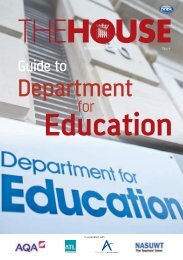Oracy
2fcBkno
2fcBkno
You also want an ePaper? Increase the reach of your titles
YUMPU automatically turns print PDFs into web optimized ePapers that Google loves.
Behaviour<br />
Teachers can worry that oracy-based activities<br />
will negatively impact on noise and behaviour.<br />
A number of interviewees feel they or their<br />
colleagues limit the extent to which they initiate<br />
such activities, fearing they will ‘undo’ work to<br />
reduce low-level disruption in their lessons.<br />
Others acknowledge that the uncertainty talkbased<br />
tasks involve can also be off-putting:<br />
“Half the battle for teachers here is stopping<br />
[the pupils] talking, so why would we want<br />
them to make them do more of it, and why is<br />
that a thing and why does it matter? It doesn’t<br />
have that status, it never has done before,<br />
because of that fear and reluctance”<br />
Andrew Fitch, Head of English & Director of Spoken Literacy<br />
Highbury Grove School<br />
“Getting children to discuss things is uncomfortable.<br />
You don’t know what they’re going to say, they make<br />
a noise, you might not feel comfortable, you might<br />
think that a noisy classroom is a sign of the teacher<br />
not being in control of what’s happening”<br />
Rachel Forward, Assitant Headteacher, King Edward VI School<br />
Some solutions<br />
There are a range of strategies that can help combat teachers’<br />
and pupils’ fears about these negative effects.<br />
• Susannah Haygarth (Literacy and Language Coordinator at Chorlton High School) believes it is<br />
important to ‘keep up the momentum’ as pupils enter year 7, and set an expectation immediately<br />
that talk is part of the learning ethos of the school<br />
• Vicki Barsby (an English teacher at Highbury Grove School) suggests celebrating what high quality<br />
talk can do for teachers’ relationships with their pupils, both in terms of teaching, learning and<br />
assessment, but also in terms of forming closer and more trusting ties with pupils<br />
• Bec Tulloch (a drama teacher and SLE at St Ambrose Barlow RC High School) says a critical first<br />
step for her school has been setting ground rules for talk that include discussing explicitly how<br />
pupils will react to one another’s contributions. This includes discussing listening skills and eye<br />
contact<br />
• Mark Crossley, (an English teacher at King Edward VI School) and Peter Hyman (headteacher at<br />
School 21) believe that giving pupils an opportunity to discuss ideas in pairs or groups can take<br />
the pressure off them, giving them time to formulate and vet their responses before talking in front<br />
of the class<br />
Amy Gaunt (Head of <strong>Oracy</strong> Primary, School 21) suggests using:<br />
• Sentence stems, which can free pupils up to think<br />
about what they are saying rather than how they<br />
are saying it<br />
• Discussion guidelines, making sure pupils invite<br />
their quieter peers to contribute<br />
• ‘Call and repeat’ to introduce new sentence<br />
stems, vocabulary or phrases. The teacher says<br />
it and the class respond. Pupils can also practice<br />
in groups or pairs. This means the teacher does<br />
not need to single out individual pupils when<br />
introducing new vocabulary or sentences<br />
60<br />
• Individualised targets for quiet or shy<br />
pupils, with a teacher saying, for example,<br />
‘I really want you to offer one reflection<br />
this lesson’<br />
• Discussion counters, which pupils can<br />
‘spend’ in order to make contributions<br />
during lessons. Teachers might, for<br />
example, ask quiet pupils to ‘spend’ two<br />
counters in a day<br />
• Tallies to count each pupil’s contributions.<br />
The teacher can then use questioning<br />
to target quieter or withdrawn pupils as<br />
appropriate




